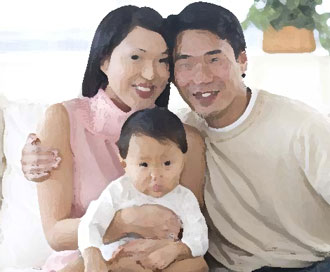I recently read an essay called 10 Reasons Why Identity Matters to Asian Americans by William Nakayama. It looks at the whole identity thing from a surprisingly utilitarian angle which is a completely new perspective for me — and I enthusiastically recommend the piece to everyone, not just Asian Americans.
One of the comments on the Nakayama essay was from a reader named “Mariko”:
I really appreciated this article. Growing up with a white father and a Japanese mother, my mother encouraged us (her children) to assimilate and think of ourselves as Americans first, however as we grew older it became increasingly clear that we would ALWAYS be of Japanese heritage first and ‘Americans’ second. For her it was more a language issue than anything else, she felt (especially as an immigrant) that having any kind of accent or linguistic confusion would hurt our chances in American society to be accepted. Looking back, that period of confusion was a learning experience to realize that even being half-white doesn’t guarantee any kind of allegiance or acceptance to white suburban society. Having a strong sense of heritage and identifying one’s roots to make our own choice about how much we’d like it to be a part of our daily lives is in my experience a very important part of being Asian in America.
Mariko, I can empathize with what you went through, having had a very similar childhood. Going through childhood and teen years while suppressing your identity is the most excruciating experience I can imagine for a child living an upper-middle-class American existence. In hopes it may help spare other young Asian Americans similar fates let me share a bit of my experiences.
My parents grew up in an age when there were few Asian Americans, at least in New York. They were among that generation of Asians who used the word “Orientals” to refer to themselves — that’s how badly they wanted not to rock the boat. To even admit to having identity issues was shameful in their books. In their minds — or at least what they revealed to my brother and me of their minds — well-adjusted kids just didn’t think about identity and stereotypes and racial prejudice. They tried their best to live up to White America’s perception of them — meek drones who obeyed the law and never bothered white people by speaking up. During my entire childhood I don’t recall a single time when either of my parents ever acknowledged that our family was different in any way from our neighbors.
It was only later that I came to understand that my parents’ idea of “normalcy” was derived entirely from TV and the movies! Imagine actually modeling your private family life on the families of Beaver Cleaver and Dick Van Dyke! Even among ourselves we used the same corny expressions we heard on TV. We never discussed topics that couldn’t be discussed on a network TV series. We never ate anything but TV food like pot roast, spaghetti, hamburgers and maraconi and cheese. Our bedrooms had paintings of white people doing white things like playing croquet. Not a single piece of Asian art decorated our home! Never did I have occasion to read a book by an Asian person except Pearl Buck (I know she isn’t actually Asian, but you get my drift!).
Of course my older brother and I were the main victims of this bizarre existence because our schoolmates certainly didn’t live by the Beaver Cleaver code of behavior. “Hey, chinky chinky!” isn’t something you hear on TV but it was certainly something we heard every day at school. “Hey, ching-chong chop-suey!” wasn’t something Dick Van Dyke’s TV kid would ever say to his classmates but our classmates sure did.
And of course my brother and I were at a loss as to how to deal with the awful chasm between my parents’ make-believe world and our very real world. We had no choice but to adopt their strategy and pretend that the non-prime-time ugliness just didn’t exist. Their refusal to open up about the issue was far more painful than the racial taunting at school. But I don’t hold it against my poor parents. Now that I am nearly their age when they were trying to raise us, I understand how much they must have been suffering in silence their own hell of non-primetime treatment at the hands of white colleagues and society.
The inevitable result of my parents’ misguided parenting strategy was that we kids ended up not talking to them. It wasn’t that we hated them. It was just that we knew that the things we wanted to talk to them about were off limits. On the one occasion when, as a small child, I brought up some racial taunts, my mother admonished me not to imagine strange things because people would say I’m crazy.
Even today I see and hear misguided Asian American parents adopt the see-no-evil, hear-no-evil strategy and feel deeply sorry for their kids. Who can you turn to when the people you most trust want to put on the official smiley-face and deny the existence of the nasty 800-pound gorilla in your personal experience of growing up a minority in America? When white people dismiss the significance of race in their rhetoric, I know it’s just out of ignorance because they’ve simply never experienced what it’s like to be a minority, but when Asians say it, I wonder at their mental health.
What finally liberated me from this hellish Twilight Zone experience was the good fortune of being accepted to one of Caliornia’s giant universities. It was like waking up from a nightmare in which I was a ghost no one could see or hear.

